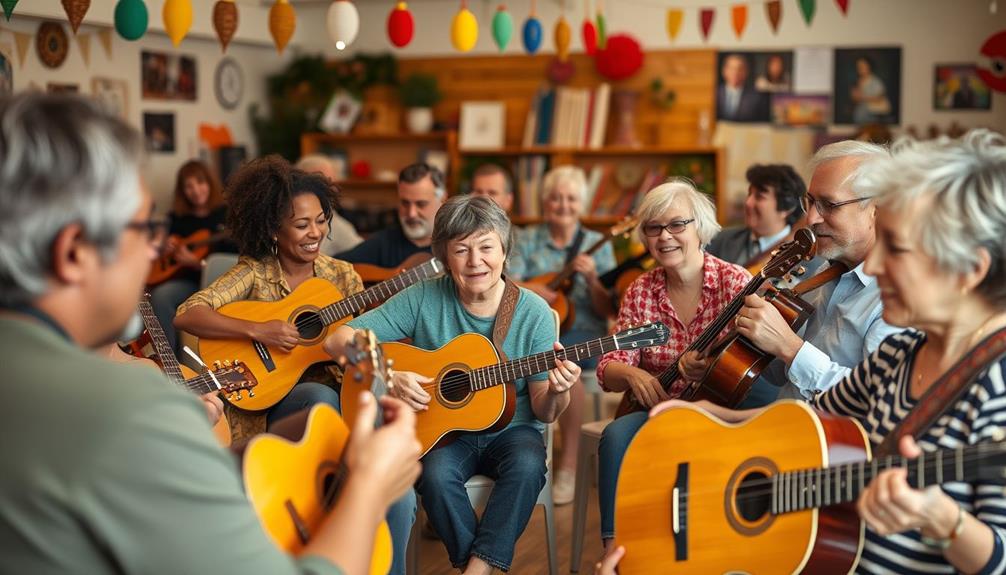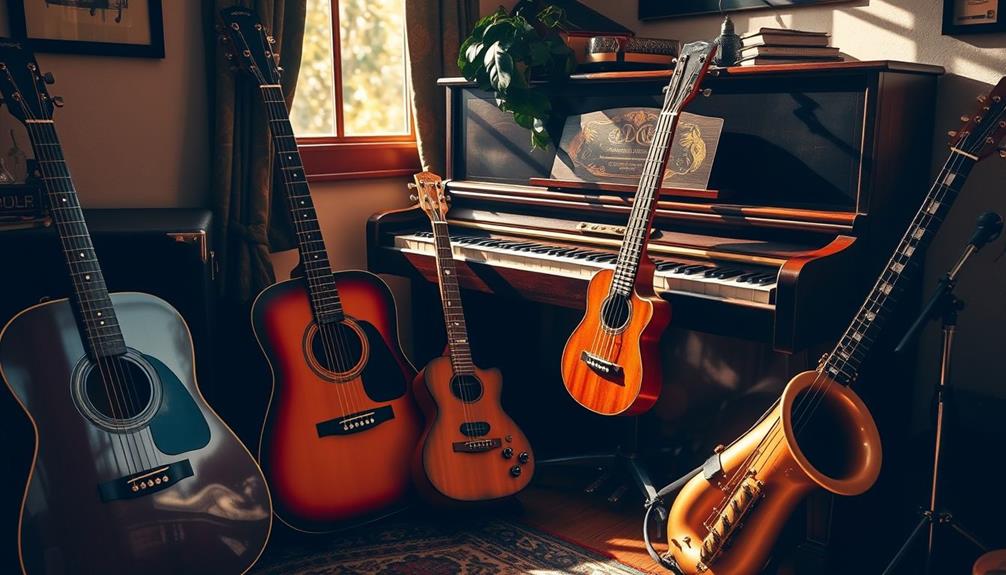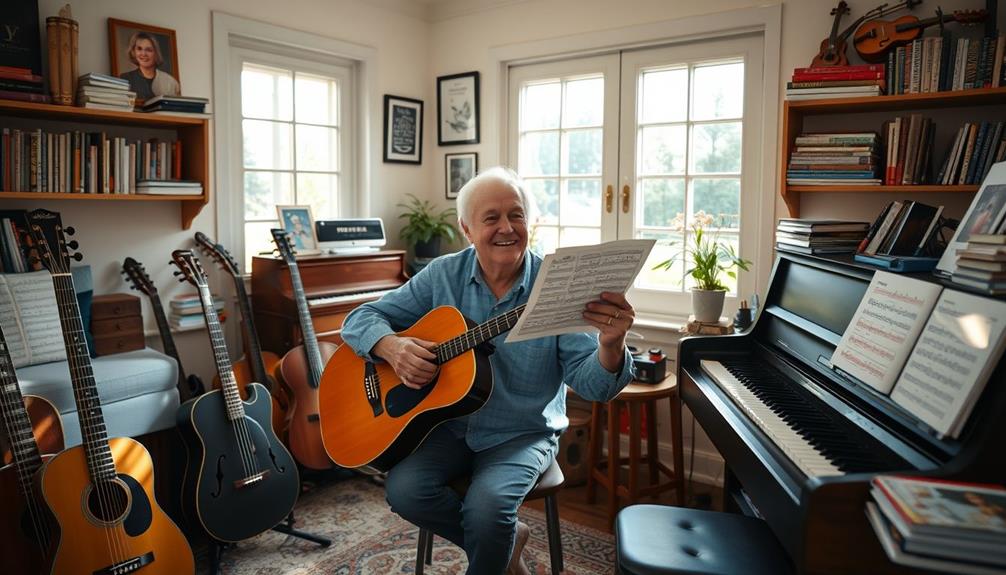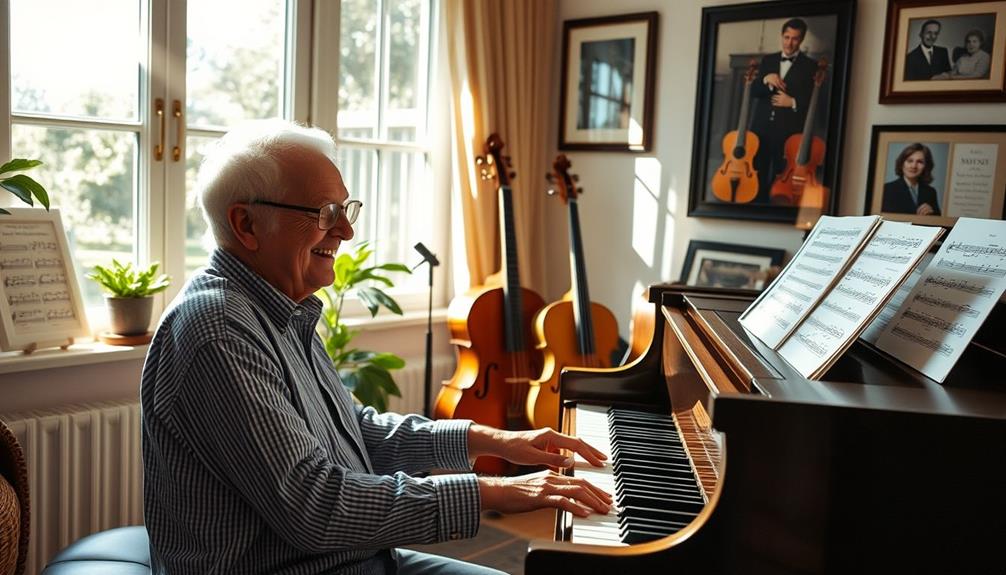Learning an instrument later in life offers amazing benefits for your mind, body, and social life. You'll boost cognitive skills like memory and processing speed while reducing anxiety through emotional expression. It's a great way to connect with others, fostering new friendships and a sense of community. Playing music also improves your physical health, enhancing posture and fine motor skills. Plus, you'll build confidence as you achieve milestones and master your instrument. By embracing this journey, you're not just hitting notes; you're enhancing your overall well-being. There's so much more to discover about this rewarding experience! In fact, research has shown the benefits of music therapy for dementia patients, as it can help improve their mood, decrease agitation, and even stimulate memories. Learning an instrument later in life can also have similar effects, providing a form of therapy and stimulation for the brain. By engaging in music, individuals can reap the rewards of improved mental and emotional well-being, regardless of their age or musical experience.
Key Takeaways
- Learning an instrument enhances cognitive function, improving memory retention and reducing the risk of dementia in older adults.
- Engaging in music fosters emotional expression, reducing anxiety and boosting self-esteem through mastery and achievement.
- Playing an instrument encourages social connections, leading to new friendships and reducing feelings of loneliness.
- Regular practice improves physical health by enhancing posture, breathing control, and fine motor skills.
- Personalized lessons and group classes provide supportive learning environments that cater to individual needs and promote social interaction.
Cognitive Enhancements Through Music
Learning an instrument later in life can open up remarkable cognitive enhancements that greatly benefit your brain. Research shows that older adults who engage in learning an instrument can see significant improvements in memory retention within just 10 weeks of practice. A 2023 study revealed that piano training boosts working memory, processing speed, and verbal fluency for adults aged 60-80.
These cognitive enhancements are crucial as they promote a higher quality of life. Moreover, incorporating activities that enhance mind-body connection may complement your musical journey, fostering greater emotional regulation and resilience.
When you learn an instrument, it activates multiple areas of your brain, fostering neuron growth and improving overall cognitive function. This stimulation is essential, especially as you age. Interestingly, musicians typically have a larger corpus callosum, which enhances communication between brain hemispheres, resulting in improved cognitive abilities.
Additionally, engaging in musical training has been linked to a reduced likelihood of developing dementia. By incorporating instrument learning into your routine, you're not just enhancing your cognitive function in the present, but you're also taking steps toward long-term dementia prevention.
Emotional and Psychological Benefits

Playing an instrument later in life can greatly enhance your emotional and psychological well-being. Engaging in musical activities promotes emotional expression, helping to reduce symptoms of anxiety and depression. As you practice, you'll find that it acts like a form of meditation, fostering relaxation and aiding in emotional processing, which enhances your mental health.
Additionally, incorporating mindful practices while learning can improve overall well-being, as a holistic lifestyle approach can greatly support emotional health.
Learning an instrument also improves your emotional regulation, allowing you to better manage stress and navigate your feelings. This can lead to a great boost in your overall mood. Mastering an instrument can enhance your self-esteem and confidence, as each small achievement contributes positively to your mental health.
Additionally, while this section focuses on emotional benefits, it's worth noting that music naturally encourages social interaction, which can alleviate feelings of loneliness and enhance your quality of life.
You might find yourself feeling more connected and fulfilled as you explore the world of music. Ultimately, the journey of learning an instrument can be a powerful tool for emotional healing and psychological growth, enriching your life in ways you mightn't have anticipated.
Social Connections and Community

Learning an instrument later in life opens doors to new friendships through group lessons and music ensembles.
Participating in these collaborative settings can create an environment similar to the camaraderie found in board games encourage teamwork and laughter.
You'll find that engaging in community activities not only enriches your musical journey but also fosters connections with like-minded individuals.
These shared experiences can lead to lasting relationships and a strong sense of belonging.
Building Musical Friendships
When you pick up an instrument later in life, you often find yourself stepping into a vibrant community of fellow music lovers. This journey opens up a world of social opportunities through group lessons and community music programs, which can provide an excellent platform for social skills development. Here, you can forge new friendships that might've seemed elusive before.
Engaging in music activities allows you to share experiences with others, fostering emotional support within this musical community. Whether you're strumming in a band or harmonizing in a choir, the collaborative nature of music-making encourages teamwork and strengthens bonds among members.
As you collaborate, you enhance your communication skills, making it easier to connect with others. Many adults discover that participation in musical ensembles boosts their confidence while helping them feel less lonely.
The joy of performing together creates lasting memories and deepens social ties, enriching your life in ways you may not have anticipated. Ultimately, learning an instrument later in life not only nurtures your passion for music but also builds a supportive network that can greatly enhance your social well-being.
Engaging Community Activities
Through engaging community activities, you can greatly enhance your social connections while deepening your musical journey. Participating in group lessons and community music programs provides rich opportunities for social interaction, allowing you to form friendships with fellow musicians. This camaraderie not only alleviates loneliness but also fosters collaborative practice and performances.
Joining musical groups encourages you to communicate and collaborate, enhancing your teamwork skills. These skills are invaluable, benefiting you in both personal and professional contexts. Additionally, as you explore diverse musical styles, you'll develop a greater cultural appreciation, connecting with others who share your interests.
Performing in front of an audience helps build your confidence and public speaking abilities, further improving your social skills and self-esteem. Here's a quick overview of the benefits of engaging in these community activities:
| Activity Type | Benefits | Social Aspect |
|---|---|---|
| Group Lessons | Develop teamwork skills | Foster friendships |
| Community Programs | Alleviate loneliness | Enhance social interaction |
| Performances | Boost confidence | Build public speaking skills |
Physical Health Improvements

Engaging in music can lead to remarkable physical health improvements, especially for older adults. When you start playing an instrument, you're not just making music; you're also enhancing your overall well-being.
According to various healthy lifestyle blogs, the act of making music can also help foster social connections, which is crucial for mental health. Here are some key benefits you can expect:
- Better Posture: Holding your instrument correctly promotes core strength and alignment, leading to improved posture.
- Breathing Control: Playing wind instruments or singing exercises your respiratory system, enhancing breathing control and lung function.
- Cardiovascular Health: Regular practice can lower blood pressure and reduce stress levels, contributing to a healthier heart.
- Dexterity and Fine Motor Skills: Learning an instrument considerably improves finger strength and coordination, sharpening dexterity and fine motor skills.
These physical health improvements not only boost your vitality but also improve your psychological well-being, making you feel more energetic and engaged in life.
Choosing the Right Instrument

Choosing the right instrument can greatly impact your musical journey and overall enjoyment. As an adult, you'll want to contemplate an instrument that not only excites you but also suits your physical capabilities.
The piano is an excellent choice; it's accessible and allows you to produce sound quickly, making it perfect for beginners of all ages. Additionally, exploring your zodiac sign may provide insights into your personality traits, which could influence your instrument choice as well, as certain signs may resonate with specific musical styles astrological compatibility can affect romantic interests.
If you're looking for something lightweight and simple, the ukulele offers a fun and engaging learning experience.
Instruments like the guitar and clarinet provide versatility, appealing to various musical styles that can keep your motivation high. You can easily explore different genres, which enhances your overall engagement in the learning process.
If you're drawn to personal expression, contemplate vocal lessons. Singing is accessible and doesn't require any physical limitations, allowing you to explore your creativity fully.
Ultimately, the key is to choose an instrument that aligns with your interests. When you pick something you love, the benefits of learning will naturally follow, helping you enjoy the journey and stay committed.
Learning Methods and Resources

When you're ready to learn an instrument, you'll find a variety of methods and resources at your fingertips.
Private lessons can offer personalized guidance, while group classes create a lively environment to connect with fellow learners.
Additionally, mastering music production software can enhance your learning experience and open up new creative avenues.
Don't forget to explore online learning resources, which can provide flexibility and access to a wealth of information about essential tools for creating enchanting music tracks.
Private Lessons Availability
Finding private lessons for learning an instrument later in life can open up a world of tailored instruction that suits your unique learning style and pace. Private lessons are especially beneficial for older adults, offering personalized guidance that addresses individual learning styles. Incorporating relaxation techniques, such as deep breathing, can help enhance your focus and enjoyment during practice sessions.
Here are some key advantages you can expect:
- Flexible Scheduling: Many instructors provide options that fit around your commitments, making it easier to prioritize your musical journey.
- Experienced Teachers: Skilled instructors adapt their methods to meet the challenges older students might face, ensuring you receive the support you need.
- Supportive Learning Environment: Private lessons foster a space free from judgment, allowing you to explore and make mistakes comfortably.
- Accessibility: Whether in-person or online, lessons can take place in a setting that's convenient for you, enhancing your overall experience.
With a variety of resources, including instructional materials and practice tools, private lessons help facilitate your skill development.
Embracing this personalized approach can greatly enrich your learning experience, making music a fulfilling part of your life.
Group Class Opportunities
While private lessons offer personalized instruction, group class opportunities bring a unique set of advantages that can enhance your learning experience. Joining group classes allows you to foster social connections that can alleviate feelings of loneliness, especially among older adults. The motivation derived from shared learning experiences is invaluable.
In these classes, you'll engage in collaboration and teamwork, improving your communication skills while building a sense of community. Many community music programs specifically cater to older adults, helping you find peers with similar interests and skill levels.
Additionally, group lessons often incorporate diverse learning methods like peer feedback and ensemble playing, leading to a richer understanding of music and better performance skills. Research shows that social interaction in group settings can greatly enhance overall well-being and mental health, making group music classes an effective strategy for personal growth in later life.
Here's a quick overview of the benefits:
| Benefits | Description | Impact on Learning |
|---|---|---|
| Social Connections | Alleviates loneliness | Increased motivation |
| Collaboration | Encourages teamwork | Improved communication |
| Community Programs | Tailored for older adults | Easier peer connections |
| Diverse Learning Methods | Enhances understanding | Better performance skills |
| Overall Well-Being | Boosts mental health | Supports personal growth |
Online Learning Resources
Embracing online learning resources can open up a world of musical possibilities for older adults seeking to pick up an instrument. With the rise of online music education, you can now access a variety of music courses tailored to your needs. This flexibility allows you to learn at your own pace and convenience.
Additionally, the incorporation of ethical frameworks in online education guarantees that the learning environment is respectful and inclusive for all participants.
Here are some key benefits of online resources:
- Interactive Lessons: Engage with material designed for adult learners, making your journey enjoyable and effective.
- Expert Instructors: Gain insights from experienced teachers through live sessions or recorded masterclasses, offering personalized feedback.
- Virtual Group Classes: Connect with fellow learners, fostering a sense of community that motivates you through shared experiences.
- Practice Tools: Utilize apps and websites that provide metronomes, sheet music libraries, and other resources to enhance your practice sessions.
These tools not only support your skill development but also enrich the entire learning process.
With online music education, you can transform your musical aspirations into reality, making the journey of learning an instrument a rewarding adventure.
Commitment to Lifelong Music Education

Throughout your life, committing to lifelong music education can yield a wealth of benefits that extend beyond just mastering an instrument. Engaging in this journey can foster personal confidence and self-image, similar to the way astrological compatibility can enhance attraction.
By learning music, you'll discover significant cognitive benefits, like improved memory retention and processing speed, especially as you age. Establishing a consistent practice schedule is vital; regular practice not only enhances your skills but also fosters resilience and patience—qualities that can be particularly beneficial for older learners.
Joining community music programs opens doors to social connections and motivation, which are essential for maintaining your commitment. You'll find that these connections can enrich your overall learning experience, making it more enjoyable and fulfilling.
To keep your progress on track, setting SMART goals—Specific, Measurable, Attainable, Relevant, and Time-based—can help you stay focused and engaged throughout your musical journey.
With access to various resources, including group lessons and online classes, you can enjoy ongoing music education tailored to your lifestyle and preferences. Embracing this commitment not only enhances your musical skills but also contributes positively to your overall well-being, making each note you play a step toward personal growth.
Frequently Asked Questions
Is It Worth Learning an Instrument as an Adult?
Learning an instrument as an adult enriches your life. You'll challenge your brain, relieve stress, and gain confidence. Plus, you'll create new connections and enjoy the fulfillment that comes from mastering a skill.
Can You Learn an Instrument When You're Older?
Absolutely, you can learn an instrument when you're older! Many adults successfully pick up new skills, finding joy in music and even improving cognitive functions. Your dedication and practice can lead to rewarding experiences.
What Are the Benefits of Instrumental Learning?
When you immerse yourself in instrumental learning, it's like opening a treasure chest of benefits! You'll sharpen your mind, boost your mood, enhance your coordination, forge friendships, and feel an incredible sense of achievement—music's magic awaits you!
What Does Learning an Instrument Do to Your Brain?
Learning an instrument boosts your brain's cognitive function, enhancing memory, attention, and problem-solving skills. It stimulates neuroplasticity, creating new neural connections and improving communication between brain hemispheres, ultimately strengthening your overall cognitive resilience.
Conclusion
To sum up, picking up an instrument later in life can truly enrich your journey. Studies show that adults who engage in music can boost their cognitive abilities by up to 30%. This improvement not only enhances memory and concentration but also contributes to emotional well-being and social connections. So, whether you're strumming a guitar or learning the piano, it's never too late to enjoy the many benefits music has to offer. Embrace the challenge and start your musical adventure today!










